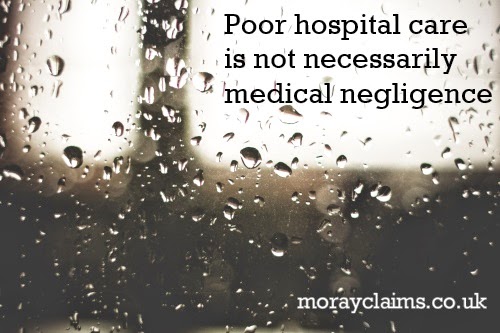
It’s always a worry if you have to have hospital treatment.
You’ll be concerned about the procedure or operation, any anaesthetic and the recovery period.
The practicalities of your stay in hospital will also be on your mind, such as sharing a ward with others and the quality of the food.
You’re unlikely to think about the risk of being injured due to medical negligence during your stay because health service staff are dedicated professionals working hard to deliver the best possible care. Their jobs require them to deal with deadlines and to keep within strict budgets. Sometimes, they have to exercise judgement in making decisions, weighing up competing risks. And medical science is not an exact science.
Unfortunately. things don’t always work out for the best.
You need to understand that, if things go wrong and outcome of your treatment is not as you would wish, just because you have experienced poor standards of care, that does not necessarily mean you have grounds for a medical negligence claim.
3 things to prove for negligence
As in other areas of the law of negligence, you can separate out three necessary ingredients for a successful claim.
Firstly, you must be able to show that the person or organisation you are blaming owed you a duty of care.
This might seem self-evident in a medical context. Surely the doctors and nurses in your medical team have a duty to take care of you?
In fact, lawyers use the term “duty of care” across the whole range of circumstances where negligence claims arise – for example, on the roads or at work – and not just in medical situations.
It refers back to the origins of the modern law of negligence in the Scottish case of Donoghue –v- Stevenson.
All it means is that there is such a closeness of relationship between the medical professional and the patient that there is duty to take reasonable care that your treatment is of a good standard.
In the same way, there is a closeness of relationship between, say, two motorists, or an employer and her employee, so the one knows that a failure to take reasonable care will leave the other at risk of injury.
The second thing you have to prove is that the treatment has fallen below the required standard of care.
The standard set by the law in Scotland for professional negligence comes from the 1950s medical case of Hunter –v- Hanley.
It is a high standard to prove and therefore often difficult to achieve even in cases where, to a lay person, negligence might seem “obvious”.
You have to be able to show that no reasonably competent medical professional acting carefully would have done (or would have failed to do) what the particular person did (or failed to do) at the time.
Because medical negligence claims are almost complaints about the work of professionals, it tends to be necessary to get an independent medical expert – someone in the same field of medicine – to analyse the facts and see whether there has been a breach.
The third essential ingredient is the need to prove that you suffered loss as a result of the breach.
What this means is that “merely” being the victim of poor quality care, without any damage or loss to you, gives you no chance of a successful medical negligence claim.
You are also not able to claim if you did suffer loss or injury but your losses would have occurred even without the breach of the duty owed to you. In other words, you cannot claim if your losses would have happened anyway.
This may sound far-fetched but it is surprisingly common in medical negligence situations for there to be problems proving the required link between the breach and the loss (lawyers call this link “causation”).
If the sub-standard treatment or care did cause you damage or loss, you may be able to make a claim.
An example here is if you had an operation and the surgeon mistakenly damaged another organ during the operation.
Your loss could include:
- the need for additional surgery to repair the damaged organ;
- loss of wages because you need more time than expected off work to recuperate;
- other longer-lasting, or even permanent, health problems.
In many cases of this type – but not all cases – it will be possible to demonstrate a clear link between the duty of care of the surgeon, the failure to meet the required standard of care and the damage suffered due to the breach.
If you are looking to claim for medical negligence, your solicitor will have to prove the interconnection between these elements.
It is important to get clear advice about whether you have been the victim of negligence or just poor care, so speak to a specialist solicitor for help.
Get in touch with us for assistance
For more information about this post or any aspect of our accident and injury claims services, please give us a call on 01343 544077 or send us an online enquiry form and we will be glad to help you (there is no charge for initial telephone or email discussions).
Original photo ‘Raindrops on a Window’ from picjumbo.com